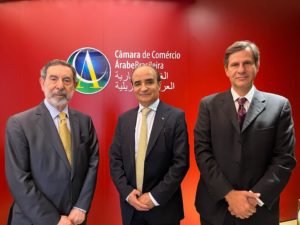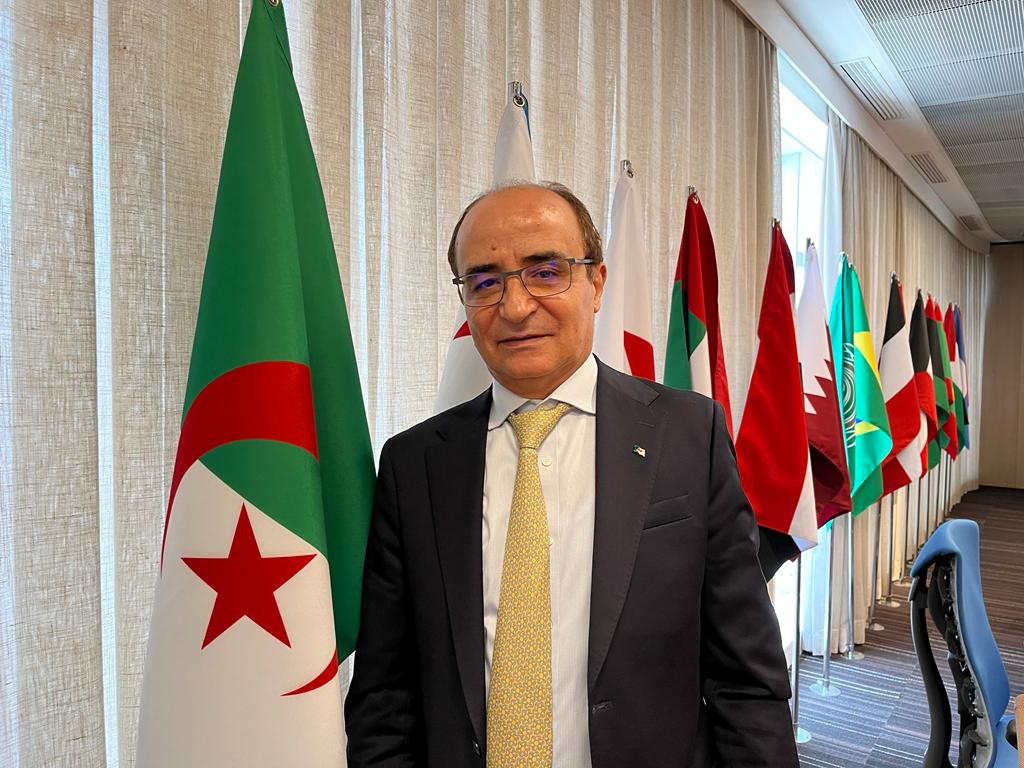São Paulo – The new ambassador of Algeria to Brasília, Rachid Bladehane (pictured above), wants to boost trade and political, diplomatic, cultural, and social relations between his country and Brazil. He took office in November last year and is on a business trip to São Paulo. This Thursday morning, the diplomat visited the Arab Brazilian Chamber of Commerce (ABCC) headquarters and met with the president, Osmar Chohfi, and the vice president of International Relations, Mohamad Mourad, this Thursday morning (24). The ABCC’s Institutional Relations analyst, Elaine Prates, also participated in the meeting.
Among the 22 Arab countries, Algeria is the sixth-largest destination for Brazilian exports and the third-largest supplier to the country. Brazil mainly exports sugar, soybeans, maize, iron ore, soybean oil, peanuts, and coffee, while Algeria primarily sells oil, fertilizers, refined petroleum, and cement to the South American country.
In an interview with ANBA, Bladehane emphasized the relationship between Algeria and Brazil has always been excellent, and this is due to the history of both countries. “We Algerians respect Brazilians a lot and vice versa. As ambassador, my role is to work to strengthen relations between countries,” he said.
For him, the relationship between Algeria and Brazil is a fertile field for development. “Our countries are ready to improve the means of cooperation within the framework of the existence of a legal and institutional basis, which is especially important, and which we must take advantage of to strengthen cooperation further. There is an effort to make commercial exchange grow,” he declared.
Bladehane’s history as a diplomat began in 1985 when he started working for the Algerian Ministry of Foreign Affairs. He was an advisor to the ambassador of the Arab country in 1988 in Argentina. In 1998, he took his first post as ambassador in Malaysia, also covering Thailand and the Philippines. In 2004, Bladehane returned to Algeria and became director-general of Multilateral International Relations at the Ministry. In 2008, he became ambassador to Venezuela, covering 15 other countries in the region, including Ecuador, Trinidad and Tobago, the Dominican Republic, and Jamaica.
Upon returning to his country, he became director-general of Political Affairs and International Security at the Ministry of Foreign Affairs in 2015. He was then promoted to the secretary-general of the Ministry. In 2020, he was appointed secretary of state or deputy minister of the Algerian Community Abroad. In November 2022, he arrived in Brazil.

“What we need to do now is coordinate mutual visits so both sides can get an idea of the countries’ economies’ possibilities to develop these relations. Algeria wants to benefit from Brazil’s expertise in the economic, technological, and commercial fields, just as Brazil is interested in internationalizing its companies. Algeria can be a point of development of this internationalization because we are in a critical geostrategic location. We are in front of Europe, a gateway to Africa, and link with the Middle East,” informed the ambassador. According to him, the country is 20 minutes away from the nearest Spanish coast, an hour from Barcelona and Marseille, and 1h10 from Rome by plane. “It is closer than going from São Paulo to Brasília,” he said.
Imports and exports
Algeria has many products that could draw the interest of Brazilian companies. In a meeting this Thursday morning, Bladehane noticed many companies were interested in urea, potassium sulfate, and Algerian fruits such as dates. We have the best dates; I do not think there is anything like it in the world. We have an ideal microclimate for the fruit. Other countries have good dates, but like Deglet Nour, none. We have 48 varieties of dates or more, but this one is the best,” said the diplomat.
Although Algeria’s main produces are still oil and derivatives, the country has invested in agriculture and domestic industry. “Algeria has evolved a lot in the economic sector, especially agriculture. Today, 30% of agricultural products come from the desert in the south. Now, there is a drip irrigation system delivering outstanding results, and this is particularly important because we no longer need to import everything, just a part,” he said.
Bladehane said the country subsidizes strategic staple products such as wheat and olive oil (produced locally) and sugar, coffee, and soybean oil. “To guarantee food security, all countries have to import a little, but we are securing the essential things. The government sells these products at a lower price than the value of the imports,” he said.
He stated Brazil has many opportunities to export and mentioned fruits such as avocado, papaya, and mango, which the Arab country does not grow. “We buy Brazilian halal beef, and Brazilians can export many products to our country. Imports to Algeria are not subject to regulation according to local production. If a company wants to import Brazilian oranges, no problem, we have excellent quality oranges, but they can import, and the market will define the prices,” he informed.
The ambassador’s primary goals in his post in Brazil are to promote bilateral cooperation and bridge the two countries in trade so companies can cooperate in this global market. “And also in the political field, of course. We have to unite because the world is experiencing a dramatic revolution. And we have to promote this exchange of views and try to bring doses of rationality to the international world, to promote international legality,” he stated, remembering the current situation in Ukraine, Syria, Palestine, and Yemen. “There must be respect for the principles of international law, regardless of the situation,” he said.
Schedule in São Paulo
During his trip to São Paulo, Bladehane will meet with authorities, trade associations, public entities, and business people. “This is a trip of contacts and exchange of information. An ambassador’s role is to bring together companies, inform and promote his country’s products,” he said. His role is also to show Brazil Algeria presents good opportunities, and Algerian companies can do the same in Brazil. Rachid Bladehane stated what he likes most about Brazil is the people.
Translated by Elúsio Brasileiro




